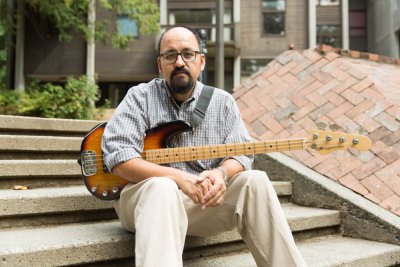Fairhaven’s Music Man Mark Miyake Owes his Love of Music to the New York Mets
Fairhaven College of Interdisciplinary Studies Assistant Professor Mark Miyake found his first radio in a dumpster when he was 10 years old; his family, first-generation Japanese immigrants, had moved to Queens, New York eight years earlier.
While his parents were uninterested in American popular music, that was not the case for Miyake, so the new radio started as a way to feed another Miyake family obsession: baseball.
“My father was very insistent that every radio in the house and car was tuned to the station that had the Mets on it,” Miyake said. “But that station, when it was not playing Mets’ games, was New York’s country music station. So I grew up exclusively listening to popular country music, which is bizarre for a Japanese immigrant in New York City.”
His music interests grew and diversified as he got older. Miyake is a music fanatic, and is also a musician himself, and has played bass in many bands over the years, with genres ranging from punk to bluegrass.
His second year of college at the University of Chicago, he began playing in a punk band called Streganona and his music career took off. He dropped out of school and traveled around the U.S. in a van playing shows, but eventually, Streganona broke up after five years.
“I considered offers from several other established musicians and touring bands to join them or start a new band,” Miyake said. “I ultimately decided that I'd rather go back to college and finish my degree then go back to recording and performing full time with someone else.”
His girlfriend (now wife, Kristin) began graduate school at Indiana University and he decided to follow her there to finish his bachelor’s degree as well.
I discovered ethnomusicology and it was like a lightbulb went on.
“I figured I would just finish college anywhere and Indiana University sounded fine,” Miyake said. “I didn’t realize it has the biggest ethnomusicology and folklore department in the country. When I was there, I discovered ethnomusicology and it was like a lightbulb went on. I took one class and was hooked, and ended up with a doctorate in it.”
Miyake’s area of research is ethnomusicology and folklore, especially in bluegrass, country and local punk and metal music. Ethnomusicology is the study of music and its influence on culture and the inner workings of communities.
“Essentially, it is cultural anthropology of the arts especially music and other forms of creative cultural expression,” Miyake said. “It is looking at musical and artistic expression and talking about how those things relate to society, community and issues including self-identification, social justice and race.”
To Miyake, the different styles and genres of music all have different ways of expressing meaning.
“As an ethnomusicologist, it’s very important to me to emphasize that different communities use different musics for different purposes,” Miyake said. “It’s about understanding the interaction between music, society and culture in specific contexts through long-term interaction and immersion within a community.”
He is also an audio production and technology expert and combines his interests of ethnomusicology and folklore and audio technology together into his teaching. Miyake said he believes these two fields go hand-in-hand and even advocates for this type of interdisciplinary teaching at ethnomusicology and folklore conferences.
“I explain the ways in which ethnomusicology and audio technology closely connect and how our students can benefit from it,” Miyake said.
His research interest in issues of race and Appalachian music and culture is reflected in his most recent article on Rhiannon Giddens, a MacArthur Fellow recipient, musician and an advocate of black banjo music and the history of black banjo music. His review of her newest album, “Freedom Highway,” is set to be published in the upcoming journal “American Music,” and he has an upcoming book that is going to published soon on the discourse on race in bluegrass music community.
Miyake leads Fairhaven’s Audio Technology, Music and Society minor along with advising multiple students in their independent studies that involves music, and is heavily involved in the local music community in Bellingham. He said he has found the perfect blend of all his interests at Fairhaven and is excited to continue to be inspired by his students and help them along their educational path.
“I feel that Fairhaven's values and the way the college is structured really reflects my own pedagogical and research interests. My fields are inherently interdisciplinary, so it's a pretty universal sentiment,” Miyake said. “I am so fortunate I get to do the things and study the things I love for a living,”
For more information about his research, contact Mark Miyake at mark.miyake@wwu.edu.
Editor's note: This is the fourth and final installment on a series of summer articles focusing on faculty research in Western’s Fairhaven College of Interdisciplinary Studies. The other articles are here:
- 'Once There Were Thousands:' WWU's John Bower researching the declining numbers of Salish Sea marine birds
- Hilary Schwandt returns from research trip to Rwanda
- Western’s Babafemi Akinrinade Researching Genocidal Atrocities Across Africa
